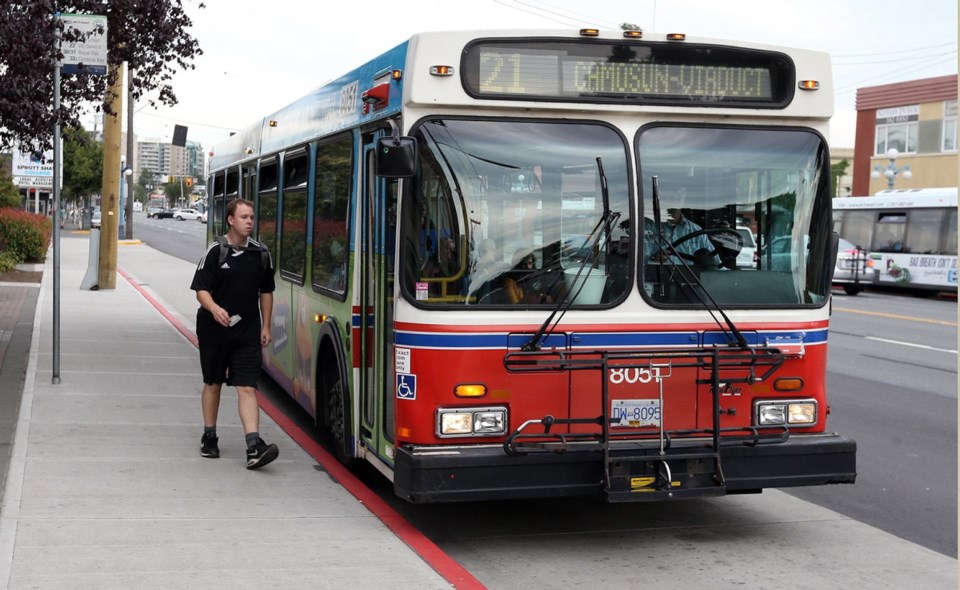B.C. Transit is planning a $21-million upgrade to its fare system, with the goal of allowing passengers to use their smartphones as tickets and eventually adding debit and credit card options as well.
The hope is that easier fare payment will encourage more people to use public transit, said Christy Ridout, B.C. Transit vice-president of business development, on Wednesday.
“Any time that something is convenient, there is a greater chance that people will be inclined to use the service.”
The system is to go into B.C. Transit’s 790 buses travelling on fixed routes around the province, Ridout said.
B.C. Transit envisions giving customers the ability to create an account online where they can buy fares and download them onto a smartphone. “Then, basically, you bring your phone with you and that becomes the ticket.”
A smartphone app would be created to store purchased fares. When boarding, a fare would be deducted via a bar code or a tap function.
It’s likely the smartphone app will be introduced first. Later, passengers will be able to use credit and debit cards to board, she said.
A pilot program will start late this year or early 2020, with the Victoria region (with 315 buses) being one of the first to have the fare system, Ridout said. It is expected to be completely rolled out in 23 regional transit systems in 2021.
Other Vancouver Island communities that will get the new system in its buses are Nanaimo, Cowichan Valley, Campbell River, Comox and Port Alberni.
B.C. Transit is a Crown corporation serving more than 130 communities and carrying 1.6 million passengers annually.
About $27 million is coming from federal, provincial and local governments for B.C. Transit’s real-time bus-tracking service and for the new fare system.
The bus-tracking, using GPS to show bus locations, is also seen as way to make public transit more user friendly. Instead of wondering when the next bus will arrive, the tracking system, being rolled out in Greater Victoria this spring, will provide fairly precise estimates.
B.C. Transit is seeking proposals from private contractors for the smartphone-based fare system.
The call for proposals gives applicants the ability to recommend the type of systems and services they could supply under a five-year contract, with the possibility of extensions. Proposals can be for cash or electronic fare collection, or for both in one package.
Ridout qualified B.C. Transit’s plans by saying the new system is its “vision.” What ultimately happens will be subject to what the marketplace can provide.
Passengers will be able to continue paying with cash, Ridout said. “It is anticipated some paper products will be retained and they will be available through the vendor network,” Ridout said.
Personal privacy and data protection is top of mind, she said. “We will ensure that we are only working with a vendor who is payment-card industry compliant and follows strict security standards. In addition, it is anticipated our chosen vendor will manage the personal accounts and B.C. Transit will not be in receipt of any personal information, only de-identified travel data and fare type.”
It is not anticipated that a zone structure with varying fares would be put in place as a result of this project, she said. Such fare structures are the responsibility of local governments, or in the capital region, the Victoria Regional Transit Commission.
B.C. Transit’s existing fare boxes have reached the end of their life and are due for replacement, Ridout said.
“We are now at a juncture where we can take advantage of some of the transformation that has happened not only in the transit industry but in the payment industry,” Ridout said.
Buses are currently equipped with magnetic-swipe fare boxes that accept plastic passes. They also accept paper tickets and cash.
B.C. Transit is not planning to follow Metro Vancouver’s TransLink system with its Compass card, she said.
“We will not be introducing a Compass card type system. Instead, we intend to leverage smartphones and eventually debit and credit cards.”
The Vancouver system allows for fare value to be loaded onto plastic cards. Fares are deducted when those cards are tapped at card readers. The Vancouver system also allows for tapping of credit cards and smartphones linked to credit cards.



